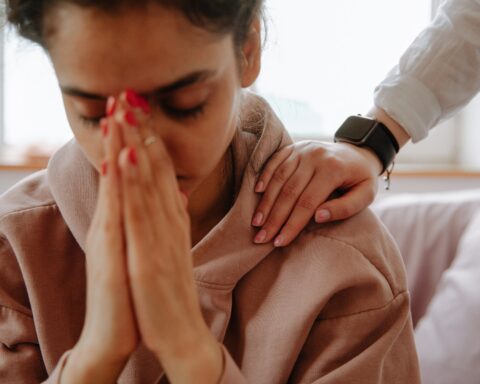Inside the main atrium of Carleton University, four women wearing hijabs (a head covering worn by some Muslim women) set up tables and stands with mounted posters and banners in one of the busiest areas on campus. The most distinct writing on the posters and banners reads #JeSuisHijabi.
They are on their feet attending to people, mostly students, who come up to them to inquire about their mission. Among the women is Anna Ahmad, a government worker who has taken time off from her job to volunteer.
“This is who we are and we can be what we want to be, wearing the hijab,” she says.
Ahmad is among hundreds of Ahmadiyya Muslim women across Canada participating in a nationwide awareness campaign dubbed #JeSuisHijabi to explain the importance of the hijab and defuse any stereotypes related to it.
“This is who we are and we can be what we want to be, wearing the hijab.”
Niqab in the last campaign
In the recent federal election, the wearing of and proposed ban of the niqab (a veil worn by some Muslim women that covers the entire head and face except the eyes) became a point of political debate.
The Conservatives insisted they were going to appeal a court decision that allows the wearing of the niqab while taking the citizenship oath, and that they would consider a ban on public servants wearing the niqab.
However, the newly elected Liberal government recently decided not to appeal a Supreme Court decision to allow the wearing of the niqab during citizenship oath taking ceremonies.
Imtiaz Ahmed, imam at the Ahmadiyya mosque in Cumberland, Ottawa says of the whole niqab debate, “It’s history now.”
[T]he #JeSuisHijabi campaign challenges a widespread portrayal of Muslim women as being inferior to men.
He commends the Liberal government for discontinuing the case. Ahmed says allowing the niqab debate into the campaign was needless and hopes this does not happen again.
Eesha Affan, one of the volunteers for the #JeSuisHijabi campaign, says the decision to wear a hijab or a niqab is to show people who they are as Muslim women.
“It’s our own decision and we want to protect our modesty,” she explains.
Equality in Islam
Ahmad says the #JeSuisHijabi campaign challenges a widespread portrayal of Muslim women as being inferior to men.
“This campaign is to create awareness that I am equal to a man, Islam allows me that equality,” she says.
She says the campaign has received some attention especially with the hashtag #JeSuisHijabi on Twitter and Facebook.
“Doing that campaign is creating that awareness of equality.”
The negative portrayal of women in Islam is more culturally related.
Ahmed says this campaign comes at the right time to correct the misconception of how women are treated in Islam. He says Islam respects women and they are not forced to wear the hijab as it is always misconstrued.
The negative portrayal of women in Islam is more culturally related, he adds.
“Islam is not restricted to women in one country. People accept Islam and they have different cultures and different backgrounds and women are suppressed in some of the cultures,” Ahmed says. “It is the cultures that are to be blamed and not Islam.”
Attacks on Muslim Women
Following the shootings in Paris, there have been increases in attacks on Muslims in Canada.
A mosque was set ablaze in Peterborough and a Muslim woman was robbed and attacked in Toronto.
“We’re trying to tell people that we are a very peaceful community and we want to tell people that what ISIS and other terrorist groups are doing is not the real Islam,” Affan says.
She says it is upsetting to hear of attacks on Muslim women and that ISIS is pushing fear into people’s hearts.
“When someone feels fear, they do irrational things,” Affan says. “So we’re trying to take away that fear; love is so much [more] powerful than hate or fear will ever be and that’s what we’re trying to put in people’s hearts.”
Ahmad emphasizes people need to be better informed. That is why the campaign’s purpose is to show people Islam is a peaceful religion.
Ahmed says attacks on Muslim women especially are very unfortunate.
“Just as those who perpetrate nefarious activities in the name of Islam don’t represent Islamic values, same thing with those who attack Muslims, they don’t represent Islamic values,” he says.
It is, however, comforting to know that the majority of Canadians have been condemning these actions, he points out. Authorities are also on the lookout for people who attack Muslims. A Quebec man was arrested three weeks ago for threatening to kill a Muslim every week in a YouTube video.
Affan and Ahmed say the constitution of Canada protects them just as it protects everyone. They want to be treated like any other citizen and not looked at suspiciously.
For the next two weeks, while they campaign in three universities as well as major shopping malls in Ottawa, they have the huge task of swaying a lot of negative stereotypes.
But even when the campaigning ends, they will still be in their hijabs and saying, #JeSuisHijabi.
As Ahmad states, “It’s a campaign within ourselves, it’s not a campaign we’ll run for two weeks, and it’s an awareness I’ll have for life.”
International Storyteller. Freelance Writer. Graduate, Carleton University Journalism School.





